Fiorello La Guardia, or how you get an airport named after you
He had some thoughts on the Immigration Act of 1924

This week I decided to read through most of the legislative debate on the Immigration Act of 1924, also known as the Johnson-Reed Act. I’m scouring it for references to Hawai’i, the Japanese and the situation with the sugar plantations there, because far be it from me to oversell you all on the connections between the Great Oahu Sugar Strike of 1920 and everything else in my scholarship.
What I’m finding so far is that the provision of the 1924 Act that resulted in a wholesale exclusion of the Japanese from immigration was somewhat of a side show, instigated mostly by the California congressional delegation. Hawai’i itself was not directly represented, as Hawai’i was still at that point a U.S. territory. So the Californians were definitely invoking Hawai’i as a harbinger of the imminent Japanese “invasion” of the West Coast, but Hawai’i wasn’t there to speak for itself. If you recall, the Hawai’ian sugar planters responded to the 1920 strike by making a bid to resume Chinese immigration, but the California delegation was having none of that. They wanted no more “Asiatics,” period—no Chinese, no Japanese, no “Hindoos” in the lumber mills, none of that. This is how the Filipino sakadas ended up being so central to the sugar plantation work after the 1920 strike: they weren’t immigrants or aliens, because the Philippines was a U.S. colony (eventually the Californians fixed that too, but not until 1934).
But again, this was a side show. As far as the East Coast was concerned, the Immigration Act of 1924 was mostly about stemming the influx of Southern and Eastern European immigration (read: Italians and Jews) by creating a national-origin-based quota system. Such a quota system had already been instituted by Congress as a sort of "emergency measure" in 1921, but that law was scheduled to sunset in June 1924. The controversy that arose in 1924 was based on the fact that the national origin quotas in 1921 had been set according to various nationalities’ representation in the 1910 U.S. Census, but the proponents of the 1924 Jackson-Reed Act wanted to now roll the clock back to the 1890 Census.
Why did they want to do that? Because most Italians and Jews were believed to have immigrated to the United States after 1890.
(Interesting sidebar, which many genealogists including myself have learned the hard way: the raw data underlying the 1890 Census had actually been destroyed in a fire in 1921 that broke out in the Commerce Building. So nobody involved in this debate actually had access to the raw data, although they had the aggregate data).
(Second sidebar: If you’re a genealogist of Eastern European heritage currently trying to figure out the “national origins” of your ancestors, good luck with that. I was told all my life that my mother’s side of the family was “Hungarian.” In reality, of her four grandparents:
one was an ethnic Magyar from Veszprem, which was under Ottoman rule for several centuries;
one may have been ethnic Slovakian whose ancestors changed their surnames as part of a mid-19th-century “Magyarization campaign,” before their entire town (now known as Košice) was given to Czechoslovakia in the Versailles Peace Conference, at which point they all fled to Rahway, New Jersey;
one was born and raised in Budapest but retained Austrian citizenship via his father, who was an ethnic German from the area of Bohemia that the Nazis referred to as the Sudetenland and from which all ethnic Germans were expelled after World War II; and
one, according to our DNA results, was a Polish man who also settled in Rahway, New Jersey, whom we all thought was just an in-law but who turned out to be quite a bit more than that.
So, imagine, if you will, what kind of methodology could conceivably have been used by Congress in 1924 to calculate “national origin” representation based on U.S. Census data that had been destroyed in a fire.)
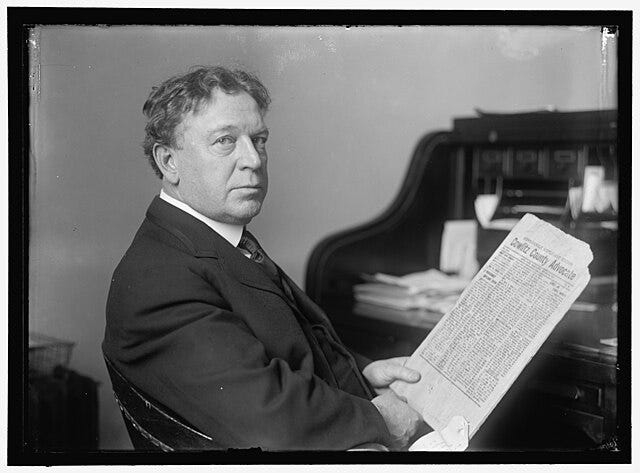
The “restrictionists” who supported the Johnson-Reed Act were deeply influenced by a group of scholars who promoted theories of eugenics: connections between race, heredity and ideology (i.e., a biological predisposition towards anarchy and Bolshevism); and the notion that members of certain races simply could not assimilate themselves into the American body politic. Indeed, anyone immigrating to the United States who was not of “Nordic stock” was seen as a threat to the body politic. The leading scholars in this field included Madison Grant, author of the 1916 bestseller The Passing of the Great Race and co-founder of the Bronx Zoo; Max Nordau (a leading Zionist, which we’ll have to unpack some other time); Charles M. Goethe, who would go on to become a strong proponent of the Nazis’ eugenics-based sterilization campaign of the 1930s (I’m dying to know if he ever co-authored a piece with Nordau); and Harry H. Laughlin, whom Congressman Albert Johnson (co-sponsor of the Johnson-Reed Act) appointed the "Expert Eugenical Agent" of the House Committee on Immigration and Naturalization.

Sometimes when I read about the racist beliefs being expressed in the distant past, I have a tendency to say to myself, “Well, that was the 1920s, people didn’t know then what they know now.” But here’s the thing: there were plenty of people in 1924 who were already calling out eugenics for the pseudo-science that it was. And among them was 42-year-old Congressman Fiorello Rafaelle Enrico La Guardia.
It hadn’t until this week fully registered with me who La Guardia was, beyond just, a former mayor of New York City. I generally associate “La Guardia” with the most horrific experience I have ever had at the American Airlines service counter. But in 1924, La Guardia, a native-born son of Italian immigrants, was a member of Congress representing Manhattan. While La Guardia was to switch between the Republican and Democratic parties several times during his storied career and would successfully run for re-election to Congress in 1926 as a Republican, at the time of the April 1924 immigration debate he was counted as a Socialist.
If you want to get a sense of his verbal delivery style, here’s a clip from 1933 when he announced his bid for mayor of New York City:
La Guardia certainly was not alone in his fight against the restrictionist proponents of the Johnson-Reed bill. Congressman Jeremiah O'Connell of Rhode Island, who announced himself “strongly and unalterably opposed to the bill,” had this to say about his own constituents:
In my State, though not in large numbers in that particular district which I represent, there are many people of Jewish lineage, forming a very important factor in the economic and social life of the State. They have joined heartily in every movement for civic betterment, have readily assimilated and have taken an active part in every endeavor to promote a higher sense of civic duty and social and political morality. Their manufacturers and business men are leaders in their particular fields, they are represented ably in all the professions, one member adorns the bench of the superior court and is one of the ablest jurists ever to hold office, in a State noted far and wide for the ability and great learning of its judiciary, both past and present. The loyalty of the Jewish residents of Rhode Island is not surpassed by that of any other race and entitles them to equal protection and consideration in the enactment of legislation of such widespread interest and application as proposed in the present bill.
The descendants of that illustrious gentleman and intrepid mariner who discovered this great continent in 1492 and made it possible for all of us to be here on this very day and hour an the greatest deliberative and legislative body in the world [whose recognition is how Congress eventually ended up designating Columbus Day as a national holiday in 1934, BTW, even though we all hate calling it that now] are most shabbily treated by the terms of the proposed bill. Their quota is reduced from 28,238 to 4,089, an almost negligible figure. And this on the flimsy pretext that they are near nonassimilable. What a shallow plea and how distantly removed from truth.
In short, O’Connell argued, “selective restriction, based upon the theory of racial superiority or inferiority, is wholly indefensible and violative of every hitherto recognized principle of American fair play. Selection and restriction are far different from selective restriction. The former may be justified on many grounds, the latter on none.”
This is all in the Congressional Record—House, from April 8, 1924, pp. 5836-37, available online here.
Congressman James Gallivan of Massachusetts had this to say about immigration restriction:
Now, I have no quarrel with those who seek to exclude the unworthy, but you must admit that no one race of people can be said to possess all the virtues or all the vices of mankind. Good men are to be found among the humblest as well as among the highest; among the Semites as well as among the Anglo-Saxons; among the Latins as well as the Nordics—by the way, the latter a new designation, the exact meaning of which no one knows. Probably it is one of the evil legacies of the late war. You know that during the struggle we had the fancy to denounce Germany for advancing the idea of the “superman” and “supernation.” Now, that doctrine of superiority which was originally sponsored in this country by the Ku-Klux-Klan seems to have found an expression in this proposed legislation. The doctrine of Nordic superiority is, in my judgment, but an extension of the German doctrine of ‘supernation,’ which we denounced so bitterly.
(Page 5849).
Congressman Samuel D. McReynolds of Tennessee, by contrast, favored restriction, observing that “[t]he census of 1920 shows nearly 14,000,000 foreign born in this country. The Italians have out of that number over 1,600,000, nearly one-seventh of the total” (query how many of them were somehow overwhelming the state of Tennessee). It was at this point that Mr. La Guardia made his first intervention, regarding a statement McReynolds about the immigration of Italian women that was patently false. McReynolds, in response, insisted that his support for the bill had nothing whatsoever to do with there being
better people in north and western Europe than there are in south and Eastern Europe; nationality or races is not in my mind…We realize the fact that many people from those countries are patriotic citizens of America, yet we cannot understand why many of these people want their nationality admitted regardless of quality. They should know that few of their best people are coming to this country, and this is one reason that we are endeavoring to restrict and limit our immigration. We are not getting the best, and I say that the character of immigration to a great extent from south and eastern Europe is not the character of citizenship which we desire in this country. With Italy selecting her emigration out of which we select our immigration, no one would expect us to receive the best class of people from countries of this kind. if they are being discriminated against, they have brought it upon themselves by permitting hordes of undesirables to reach our shores.
To be fair to Mr. McReynolds, he was not entirely inaccurate as to what the Italian landed gentry was up to in encouraging emigration of landless peasants, as I discussed here:
But he then added,
I notice from the press a few days ago that the distinguished gentleman from New York [Mr. La Guardia] addressed two or three thousand foreigners in Philadelphia, wherein it was reported he said that the Johnson bill is the product of a narrow and bigoted class.
Mr. La Guardia: I stand on that statement.
Mr. McReynolds: Yes. This same gentleman made a statement on the floor of the House not long since, that he was surprised at the stupidity of Congress, or words to that effect…
A little while later, Congressman John Tillman of Arkansas, previous proponent of a Jim Crow law as a state senator back home, declared that “we have admitted the dregs of Europe until America has been orientalized, Europeanized, Africanized, and mongrelized to that insidious degree that our genius, stability, greatness, and promise of advancement and achievement are actually menaced.” No, no racism or bigotry going on there.
(p. 5865).
A little while later, La Guardia finally got his own 15 minutes of floor time. He started off by establishing his credentials as an expert on immigration, having served as an immigration inspector at the Port of Fiume and then three years as an interpreter at Ellis Island. When your colleagues are debating the racial inferiority of Italians and your name is Fiorello Rafaelle Enrico La Guardia, certain things can just go unsaid.
I have to wonder if he was on duty the day my 3-year-old grandmother came through Ellis Island with her family in 1914 (this was the daughter of the ethnic Magyar from Veszprem and the Austrian national from Budapest whose ancestors were German Bohemians).

Anyway, he then got right to the point:
What the gentlemen of the House are entitled to know in illustrating this human problem is not synthetic statistics, not arguments based on religious prejudices and racial hatreds, but a scientific report on the economic conditions of our country, the unemployment situation and the need of labor needed labor at this time and for the next 10 years, based upon existing conditions and the actual experience of the past. That phase of the question has been entirely ignored. We hear, instead, extracts from the books of cranks, theories upon racial reproduction, vagrancies on assimilation, and expressions of fear for the future of the Republic unless we slam the door in the face of races which have a thousand years back of them and open the doors only to Anglo-Saxon stock…
…[E]very speaker in support of this bill has avoided entirely explaining the reduction in Jewish immigration. They know that their position is unexplainable and unjustifiable. The Jewish immigration is covered in the immigration from Russia, Austria, Poland, Hungary, Czechoslovakia, and Romania, and they group these countries, juggle their figures, do a few acrobatics in logic, and say there is no discrimination…I charge that your basis of 1890 is absolutely and intentionally discriminatory agains the immigrants of Jewish faith and against the immigrants from Italy, Greece, Czechoslovakia, Poland, Russia, Hungary, and Austria, and I do not qualify that charge one bit. The basis of 1890 was taken only because it was the only census that would lend itself to the dirty work that is attempted to be done by the secret influences back of this bill.

(p. 5886)
As for the Italian immigrants,
Come to our schools in New York and you will see hundreds of thousands of little black-headed sons of Romans poring over their a, b, c’s in the grade schools; in the high schools preparing themselves for the duties and responsibilities of American citizenship. Is it fair, is it manly, is it accurate to paint an instance here and there out of a population running into millions of a crime committed and hold that such a case is typical of the immigration of an entire race? The Croatians, hard working, honest, industrious, you will find in the mines all over the country, and what better example of assimilation than that of the Croatian and the Italian—why, on the other side a Croatian and an Italian can not get along; they have been instigated and primed to hate each other by the cunning and trickery of European politics. They come here, work side by side, live in the same neighborhood, their children go to the same schools, no hatred, no hard feeling, living in perfect harmony, friendship, and love, their children intermarry. Why? Because they have immediately become entirely and absolutely assimilated. They are Americans in thought, spirit, and in attitude, and yet you come here and say that this newer immigration can not be assimilated.
He also had this to say about immigrants supposedly filling up the nation’s insane asylums:
Reference is made from time to time concerning the statistics of aliens in our insane asylums. Gentlemen, when you refer to statistics in an insane asylum and your charge that to racial causes, when you charge that to immigration, I say with all due deference and respect that you do not know what you are talking about. It is true we have aliens in our insane asylums in New York, and you have them in other asylums in other parts of the country, but gentlemen, they are not there because they are aliens. if they were at home and never came to this country they would not be in an insane asylum. If instead of aliens we had to draw entirely from your native Nordic stock to put in our factories, in our mills, in our shops, under the river-boring tunnels, the toil of modern industry under our production system, just as your toll of death and casualties of war, you would have an equal number in those insane asylums of your preferred Nordic stock. It is the pressure, the tension, of modern machine industry to which human beings are subjected that accounts for the number of insane. it is the constant, continuous go, go, go of your big industrial centers that breaks the human system. Do not believe that in stopping immigration from Italy and Rumania and Russia that you are going to stop insanity. As long as under the present competitive system we use human beings as cogs in a machine we will have our insane asylums occupied.
(I did warn you he was a Socialist).
Did La Guardia and his colleagues win this debate? They did not.
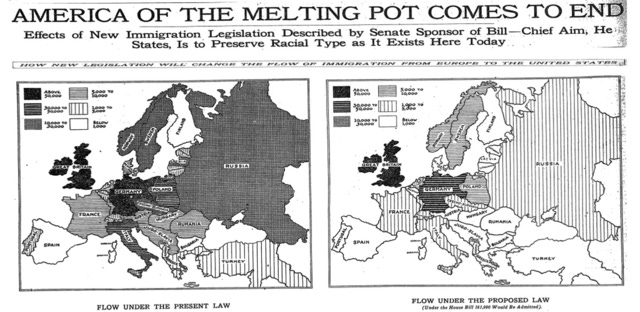
The Johnson-Reed Act was enacted into law, and the quota system, which indeed had dire consequences for Jewish immigrants fleeing from Europe, was not abolished until 1968. But it was not an easy victory, and the bill’s proponents did not prevail by all that much.
Anyway, I’m pretty sure La Guardia has an airport named after him because he not only served as the mayor of New York City from 1934 to 1946 but is generally regarded as the best big-city mayor in U.S. history (you notice there is no Giuliani airport or De Blasio airport, and from the looks of it, I’m not anticipating an Eric Adams airport, either). But I think he was already earning that honor in the halls of the U.S. House of Representatives on April 8, 1924. Read it for yourself in its entirety and see if you agree.





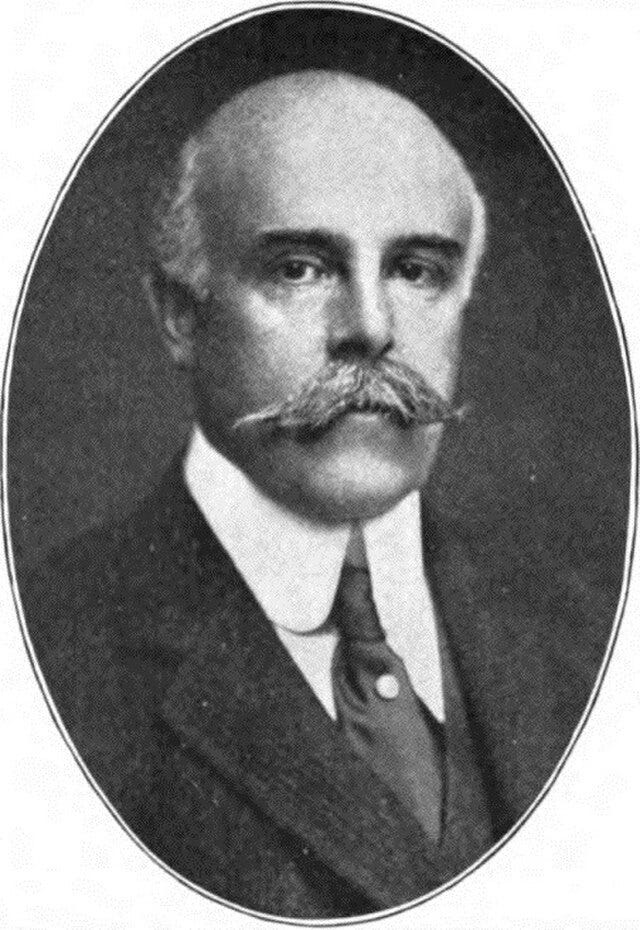
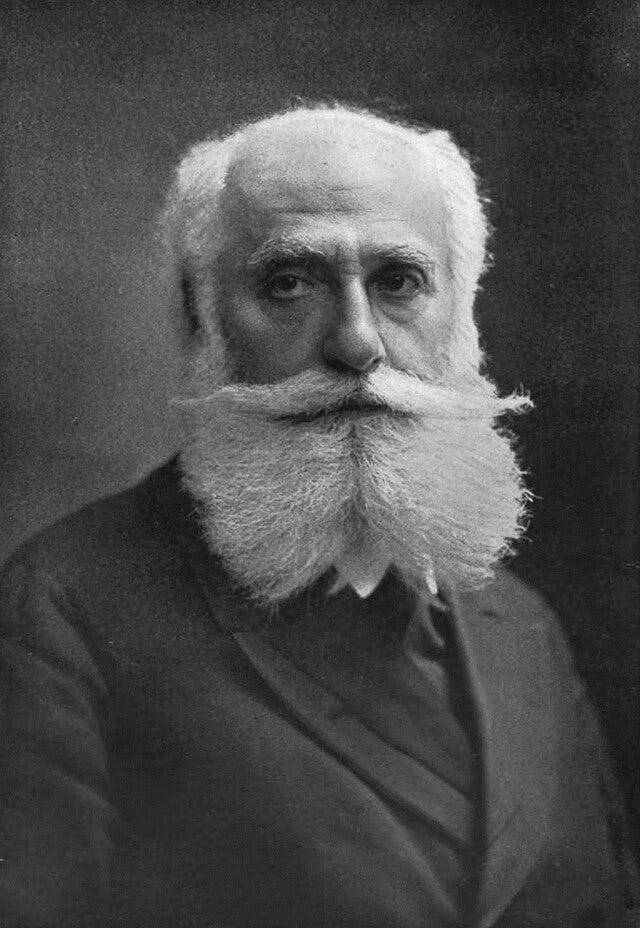
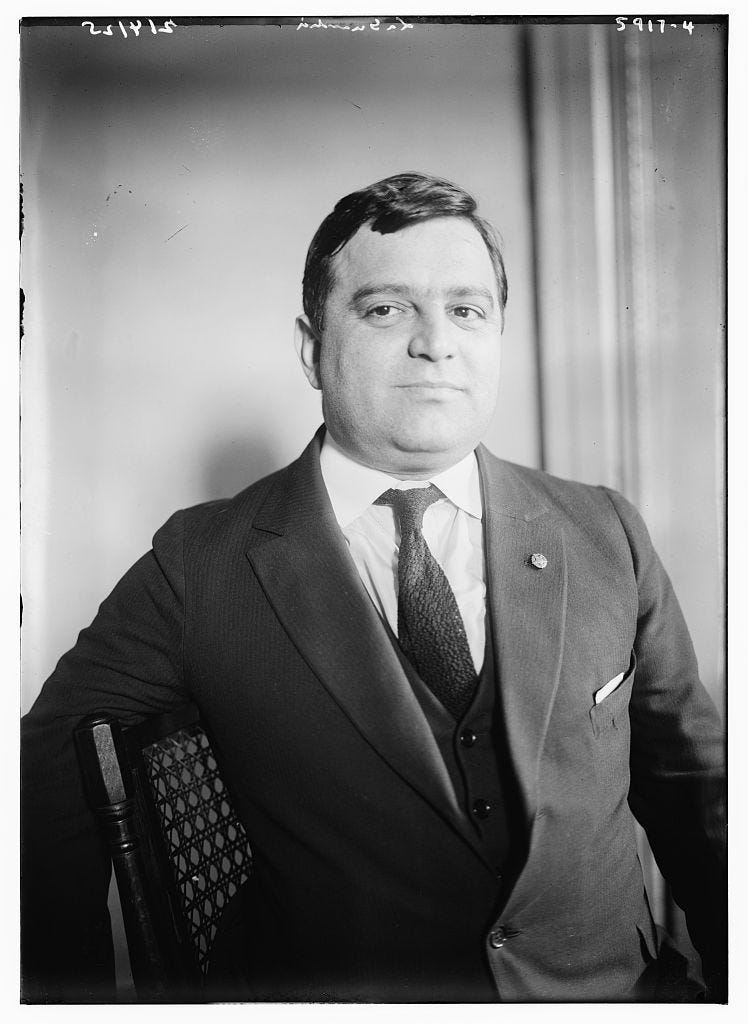

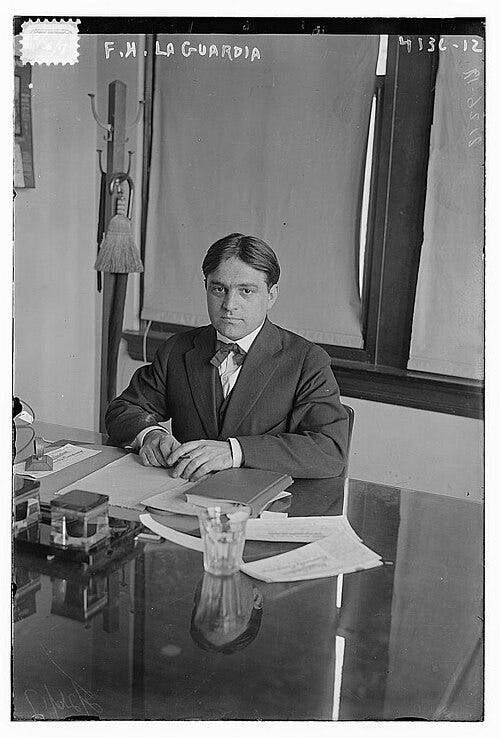

Fantastic and fascinating!